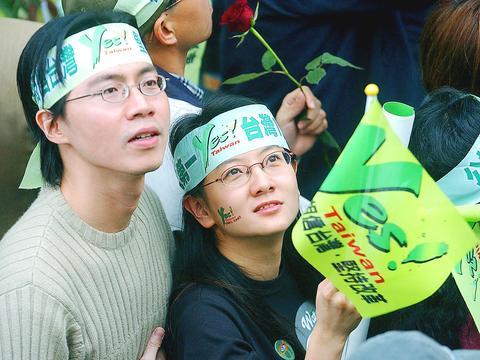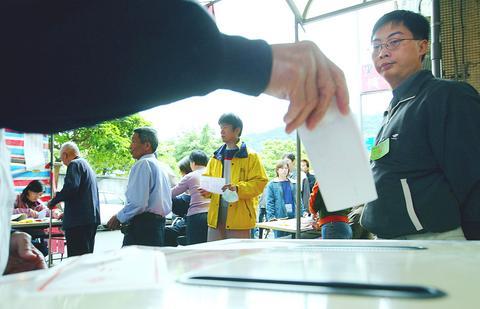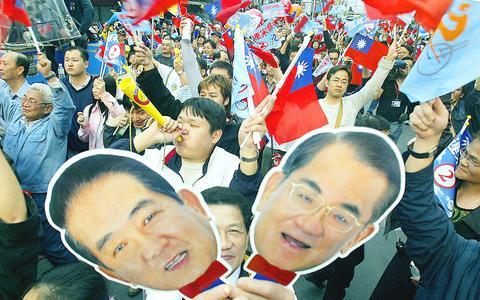Taichung, 8:05am

PHOTO: AP
Finishing their morning exercises in Yingtsai Park, a group of elderly women swung their arms and chattered excitedly, looking not unlike a gaggle of geese in their black and white exercise uniforms.

PHOTO: REUTERS
On a normal day, the group would part company after their morning meeting, but this day they finished off with one last exercise: voting. A community center in the corner of the park had been converted into a polling station. Police officers had just opened the doors and perched themselves on plastic stools outside. They were there to guard the ballot boxes and keep the peace following one of the least peaceful days in Taiwan's history.
But although Friday was a fireworks frenzy of campaigning that climaxed in an attempt on the president's life, the polls were relatively quiet on election day. The shouting match had fallen silent. The only commotion here was coming from the group of women making their way through the park to the community center, swinging their arms and scaring birds out of sakura trees.

PHOTO: AFP
Perhaps it was quiet because this area in the heart of Taichung City leans heavily toward the Chinese Nationalist Party (KMT) and it's candidate, Lien Chan (連戰).
You could almost figure the demographics yourself watching people as they lined up to vote. The group of a dozen uniformed ladies joined the line and one by one disappeared behind the white curtains. A few of them, though, lingered in the courtyard before getting in line.
"They can go first," said Wang Pei-juan (王珮娟) as she chatted with three other women. The reason became apparent when the first set of women was seen casting their presidential ballots and immediately exiting the polling station. Wang and her smaller clique cast their presidential ballots, then disappeared behind a second set of curtains to vote in the nation's first referendum, which the incumbent candidate, President Chen Shui-bian (陳水扁) has strongly promoted and the opposition has boycotted.
"It's unfair that the [Central Election Commission] has demanded that the ballots be separated," Wang later said. "They say it will prevent many problems, but it creates other problems." She explained that many households were as divided as the nation itself and to have to go behind curtains twice made a person's choices less than secret.
Her fears may have been unfounded. Another woman coming out of the polling station later in the morning, Jenny Hsieh, said that even though she voted for Lien, she cast her vote in the referendum, too. This was the first election the 30-something bar owner had ever voted in -- the first one she was able to vote, having come from China 10 years ago.
"I voted in the referendum because I could," she said, without revealing how she answered the two questions. And what did she think of Taiwan's heated democracy and Friday's assassination attempt?
"They missed," she said.
Xinchang Borough, Hsichih, Taipei County, 10:30am
Under a dreary, dark sky and slight drizzle, voters of the Xinchang Borough in the Taipei satellite city of Hsichih yesterday morning were greeting neighbors and lining up to vote as they filed into the local Land God temple, which had been converted into a polling station. Some dutifully stopped to make three bows as they passed the altar before joining the short queue, though most made quick work of voting and left within minutes.
Andy Chen, a 30-year-old biotech engineer and lifelong resident of the neighborhood, was one of the few who lingered at the temple, watching the small crowd intently. His wife was a volunteer in the voting station and he'd come to check on her safety, feeling some concern over possible violence after Friday's assassination attempt on the president. In 2000 he voted for Chen, he said, but this time around had cast his ballot for the Lien Chan and James Soong (宋楚瑜) ticket, disappointed by what he called the incompetence of the DPP administration. He had little patience, however, with the extremism that had arisen during the bitterly fought campaign on both sides.
"I don't really think anything will happen here, but then I didn't think anyone would shoot the president. I was a bit worried that people would be overly excited," he said.
Here, voters were patting each other on the back to say good morning and rushing to assist an elderly couple trying to make it up the three steps to the voting station.
The drama of the attempt on the president's life that monopolized air time on TV Friday seemed already worlds away both from people's minds and their conversations.
At the temple, the three unarmed policemen stationed there to guard the ballot box chatted casually while sipping tea and passing around Long Life cigarettes. If the possibility of a disruption was on their minds, they weren't showing it. When the outside chance of someone going berserk at the polling station was raised, one joked and pointed over his shoulder at the shrine: "No way. Not here. The gods are
watching."
Perhaps, but Andy Chen was taking no chances. "The president getting shot might give people pause to think rationally about politics in Taiwan. But, it might also trigger more emotions," he said.
Renai Elementary School, Dunhuang Borough, Taipei City, 3:45pm
At Dunhuang Borough's Renai Elementary School located along an upscale stretch of Anhe Road in downtown Taipei, election day progressed along the lines of any typical Saturday: the neighborhood kids jammed the schoolyard for games of basketball and soccer, while parents stopped by to step into one of the two classrooms that had become polling stations for the day.
Other young and trendily dressed borough residents double-parked their Mercedes and SUVs outside the school's gates, rushing into the voting booths with cellphones pressed to their ears.
With a jovial smile beaming from under a Taipei City Mayor Ma Ying-jeou (馬英九) campaign baseball cap, 80-year-old Wang Fang-ting (王方廷), took in the hectic to and fro sitting by the entrance to the school. Clearly a popular character in the neighborhood, voters stopped to shake his hand and wish him well while he bent over to say "hi" to kids in his thick Shandong accent and russle their hair.
Having fought in the Chinese Civil War and followed Chiang Kai-shek (蔣介石) to Taiwan in 1949, he was unfazed by the excitement of the election. He voted for the pan-blues, but admitted to doing so mostly out of habit.
"Ah, whoever wins it'll all be the same. All that matters is that the country is stable," he said. "I heard people saying they wish the assassination attempt had succeeded, and others saying that it was all staged. But that's not a very constructive thing to say."
As the voting stations prepared to close, the crowds thinned out and the kids continued their games on the playground.
Meanwhile, the nation's voters went home to watch TV and bite their nails as the results in the close race poured in from around the country.
Tainan, 5pm
The polls closed an hour ago, the ballot boxes had been sealed and counting had begun. It was hard to find any shopkeepers who were keeping shop. Every pair of eyes was glued on the television, watching the ballot count climb. A dozen youths sat silently at a noodle stand. Minutes crawled by and noodles, untouched, got cold. The owner, surnamed Chiang, was the most nervous of all. He got up to change the channel and, not liking what he saw, changed it back.
"A-Bian is in the lead," he said, "He has 4.7 million to Lien's 4.3 million." His daughter grabbed the remote control and switched it back.
"He has 5 million votes to Lien's 5.3 million. He's losing," she said laughing at her father. He was not amused.
If Taichung was a bastion of KMT support, Tainan was that and more for the DPP. Most everyone asked on the street was wanting A-Bian to dong suan, or get elected, as the Taiwanese say.
As the hours ticked by and hopes rose for the green camp, they faded for the blue. By 7pm lights were off at a local KMT campaign center. A television illuminated a few silhouettes of stragglers still hoping.
Across town, a crowd was gathering at the local DPP headquarters. A stage had been lit and thousands of supporters of A-Bian were spilling onto the street, bringing traffic to a crawl. No one cared. In Chen's hometown, even blue-camp supporters seemed happy to see the local boy make good -- again.
Then 7:30 passed. The vote seemed too close to call but it didn't stop the crowd from growing and getting louder. Bullhorns, a sea of green flags and smiles seemed to will Chen to re-election. Finally, their man was seen on a giant screen satellite link from Taipei, smiling, and the place erupted into pandemonium. Everyone was flailing arms, there were hoarse shouts and tear-streaked cheeks. This was the place where A-Bian was headed on Friday when he was stopped by a bullet. Now he'd arrived.
Taipei DPP Campaign Headquarters 8:10pm
By 8pm last night, the controversial result of the election had been announced on most media outlets, setting loose a wave of euphoria at DPP campaign headquarters at the corner of Jianguo North Road and Minsheng East Road where a throng of thousands of Chen supporters had gathered jamming the streets.
Supporters blasted air horns and shouted in waves of choruses: "A-bian, dong suan!"
Random strangers hugged each other and people with extra A-bian flags and banners shared the wealth with the hundreds of supporters that continued to flood toward the intersection.
Johnny Yeh (葉火瓊) could barely contain his excitement, summing up his excitement by gesturing a thumbs-up and shouting, "Taiwan number one!"
Taipei KMT-PFP Campaign Headquarters 8:40pm
The mood in front of the Lien-Soong campaign headquarters a half hour later couldn't have been more different. It was a mixture of paralyzing disappointment and shivering anger. Speakers onstage were working up the crowd with claims the election was a sham and many were believing that take on events.
The incredulity at the loss was palpable as some in the masses began filing away from the headquarters, their heads hanging and refusing photographs and interviews with a sharp wave of the hand.
One college student in a PFP wind-breaker, who was willing to talk but wouldn't say his name, shook his head in disgust. "It's all such a joke. It's horrible to lose by so little. I'm not sure if it was rigged or what, but I guess we're going to have to accept the outcome."

William Liu (劉家君) moved to Kaohsiung from Nantou to live with his boyfriend Reg Hong (洪嘉佑). “In Nantou, people do not support gay rights at all and never even talk about it. Living here made me optimistic and made me realize how much I can express myself,” Liu tells the Taipei Times. Hong and his friend Cony Hsieh (謝昀希) are both active in several LGBT groups and organizations in Kaohsiung. They were among the people behind the city’s 16th Pride event in November last year, which gathered over 35,000 people. Along with others, they clearly see Kaohsiung as the nexus of LGBT rights.

Jan. 26 to Feb. 1 Nearly 90 years after it was last recorded, the Basay language was taught in a classroom for the first time in September last year. Over the following three months, students learned its sounds along with the customs and folktales of the Ketagalan people, who once spoke it across northern Taiwan. Although each Ketagalan settlement had its own language, Basay functioned as a common trade language. By the late 19th century, it had largely fallen out of daily use as speakers shifted to Hoklo (commonly known as Taiwanese), surviving only in fragments remembered by the elderly. In

Dissident artist Ai Weiwei’s (艾未未) famous return to the People’s Republic of China (PRC) has been overshadowed by the astonishing news of the latest arrests of senior military figures for “corruption,” but it is an interesting piece of news in its own right, though more for what Ai does not understand than for what he does. Ai simply lacks the reflective understanding that the loneliness and isolation he imagines are “European” are simply the joys of life as an expat. That goes both ways: “I love Taiwan!” say many still wet-behind-the-ears expats here, not realizing what they love is being an

In the American west, “it is said, water flows upwards towards money,” wrote Marc Reisner in one of the most compelling books on public policy ever written, Cadillac Desert. As Americans failed to overcome the West’s water scarcity with hard work and private capital, the Federal government came to the rescue. As Reisner describes: “the American West quietly became the first and most durable example of the modern welfare state.” In Taiwan, the money toward which water flows upwards is the high tech industry, particularly the chip powerhouse Taiwan Semiconductor Manufacturing Co (TSMC, 台積電). Typically articles on TSMC’s water demand